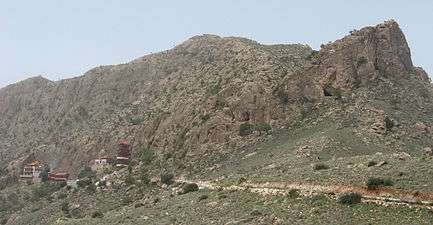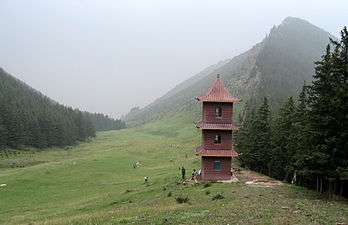Helan Mountains
| Helan Mountains | |||||||||||
 The lower parts of the range are dry and barren. | |||||||||||
| Chinese name | |||||||||||
|---|---|---|---|---|---|---|---|---|---|---|---|
| Chinese | 贺兰山 | ||||||||||
| |||||||||||
| Alternative Chinese name | |||||||||||
| Chinese | 阿拉善山 | ||||||||||
| |||||||||||
| Mongolian name | |||||||||||
| Mongolian Cyrillic | Алшаа уул | ||||||||||
| Mongolian script |
| ||||||||||
| |||||||||||
The Helan Mountains, frequently called Alashan Mountains in older sources, are an isolated desert mountain range forming the border of Inner Mongolia's Alxa League and Ningxia. They run north-south parallel to the north-flowing Yellow River in the Ordos Loop section. The river is mostly east of the mountains, but in the north it crosses without making a significant gorge and flows on the west side. To the west is severe desert. To the east is an irrigated area with the towns of Yinchuan and Shizuishan.
They are about 200 km from north to south, from 15 to 50 km wide and average about 2000 meters in altitude (the Yellow River here is about 1,100 meters above sea level). Their highest peak is 3,556 metres (11,667 ft).
Emerging wine industry

With the increasing popularity of Ningxia wines, the Chinese authorities have given approval to the development of the eastern base of the Helan Mountains as an area suitable for wine production. Several large Chinese wine companies including Changyu and Dynasty Wine have begun development in the western region of the province. Together they now own 20,000 acres of land for wine plantations and Dynasty has ploughed 100 million yuan into Ningxia. In addition, the major oil company China Petroleum and Chemical Corporation has founded a grape plantation near the Helan Mountains. The household appliance company Midea has also begun participating in Ningxia's wine industry.[1]
References
- ↑ "Grape expansion: Chinese wine companies move west", Want China Times, 15 December 2011. Retrieved 17 December 2011.
Coordinates: 38°54′N 105°58′E / 38.900°N 105.967°E